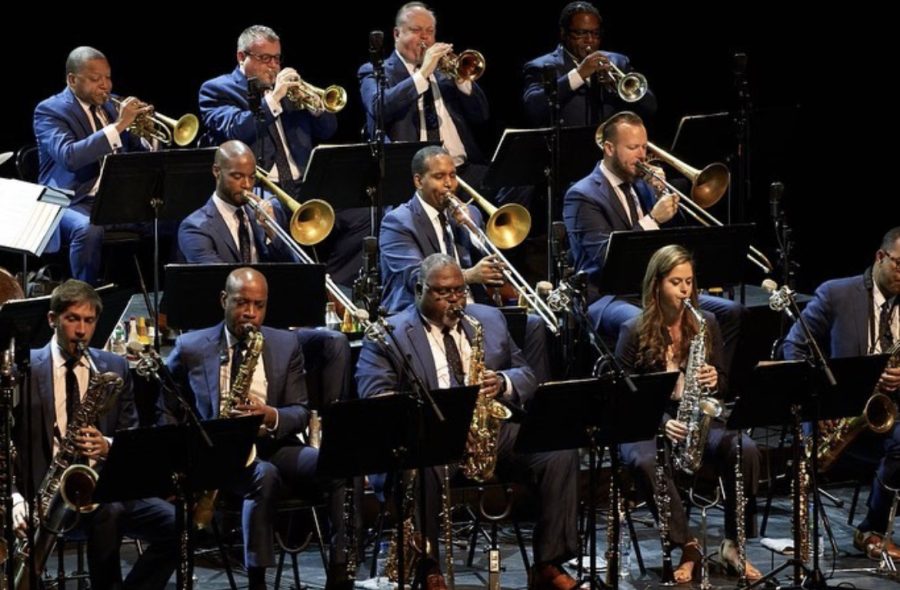Wynton Marsalis Headlines at Jazz Fest
Storied musician encourages students to think about the big picture
New Trier Jazz
Wynton Marsalis playing his headlining show with fellow jazz musicians in Gaffney Auditorium at the annual New Trier Jazz Festival
Last weekend, students, parents, and music lovers alike flooded to the Gaffney Auditorium to witness legendary jazz musician Wynton Marsalis and his brother Delfeayo Marsalis headline at the annual New Trier Jazz Festival.
“We were unbelievably lucky and fortunate to book the Jazz at Lincoln Center with Wynton Marsalis,” points out Director of Jazz Ensembles Nic Meyer. “It is the best big band in the world led by one of the most accomplished and famous jazz musicians alive, and it’s incredibly rare that they will perform at a high school.”
The two day event saw performances from almost every student in the New Trier Jazz program. On Saturday night, New Trier’s Jazz Ensemble 1 played an opening set for Delfeayo Marsalis’ New Orleans-based Uptown Jazz Orchestra. With nearly two thousand people packed into the auditorium, the anticipation was high.
“I was nervous leading up to the performance,” says senior and alto saxophonist Zach Gould. “But when you step on stage, you realize you’ve practiced so hard for this moment and you don’t feel nervous anymore.”
Senior Emily Connerty plays trumpet. “During my solo I just closed my eyes. It was just like we were rehearsing on stage as we had been for the last week and a half. The lights were so bright, I just pretended like I couldn’t see anything.”
The support of the crowd aided in this feeling, added Gould. “When everyone is screaming and cheering for you, you’re not scared, you’re just energized.”
The preparation for this event began well before the big headline bands were booked, even far beyond the beginning of the school year. Connerty recalls Jazz Festival 2020, where she first saw the Jazz at Lincoln Center perform live.
“As freshmen, it was a life changing moment. It was just incredible to look up and be like ‘that’s gonna be us one day.’ That’s really when the mental preparation set in.”
However, for Meyer and his students, Marsalis’ influence extends beyond the lines of the music he plays.
“Wynton Marsalis is kind of a bridge between generations of jazz musicians,” says Gould. “Wynton played with a lot of old school players and is now able to pass it on to not only us but members of his orchestra, his generation.
“Its roots are in the resilience, the ingenuity, and the brilliance of African American artists who hold onto their forms of communication and develop it into this highly expressive art form,” he says.
“Jazz is the music of America,” agrees sophomore guitarist Vincent Anderson. “It came out of the struggle of African American people, and then it eventually became the music of all people.”
Sunday headline Wynton Marsalis is a recipient of nine Grammy awards, a Pulitzer Prize for music, and a National Medal of Arts. He also lectures at Harvard University, and is an outspoken social activist. Meyer often echoes with his students the parallels that Marsalis has drawn between jazz music and democracy.
“Democracy puts a lot of requirements on the participants,” he explains. “In a democracy, we have these dueling challenges in that democracy allows for a lot of personal freedom, but it also tells us that we have to find common ground.”
In jazz, each musician must use their own voice to improvise within the context of a piece. However, the success of the band also depends on everybody working together and drawing off of the playing of others.
“It’s this constant tug and pull between coming together and being one,” adds Meyer.
Jazz Festival also offered other opportunities for student musicians. On Saturday, schools from across the Chicagoland area came to perform short sets. This year, they were joined by local trumpeter Victor Garcia and his band as well as the DePaul University Jazz Workshop for short performances and clinics with some of the most talented musicians in the area.
Another unique opportunity for students was the Women in Jazz Dinner, which presented an opportunity for the young female musicians at Jazz Festival to interact with their professional counterparts.
“I heard from a number of students and directors that the opportunity for those connections was really meaningful,” said Meyer.
In the end, Meyer wants the non-musicians at Jazz Festival to have appreciation for the hard work and dedication of the musicians they saw perform.
“I think it would be really helpful if we were more proud of our American arts,” he says.
“We talk so much about the negative effects of the origins of our country,” says Zach Gould, “but we can also celebrate what came out of it, jazz music.”







































